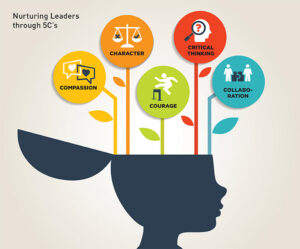I had intended to write this post sooner, but something kept distracting me…

During the second week of class, I found myself the most productive and yet the least engaged in blogs and Discord. This was because I was camping in a location with very poor cellular service, and screens became obsolete. I had to travel to a nearby town (shout out to Quilly Willy) to access the internet for all my needs, including debating against technology. Cell phones, even in the most well-intentioned and mature hands, can be a distraction.
The lure of the cell phone’s siren song is always going to be there, unless users learn how to develop healthy habits. Where do people learn healthy habits? Well, probably their phones, but before the ubiquity of mobile phones, people learned healthy habits in their homes and their schools. These devices are not just fidget spinners; they are here to stay, so whose job is it to model appropriate cell phone usage?

Can appropriate use be modelled in an environment where devices are banned? Probably somewhat, but I would argue that students need to have the real-life experience of making the choice to focus on work, to ignore the cell phone instead of it being banned outright. Imagine if getting your driving license never involved any real practice driving and just involved watching videos and sitting in the passenger seat. Not to mention, with the speed of phone upgrades and the prevalence of older devices in homes, students could just be turning in a ‘dupe phone’.
Somehow, policies find a way to disproportionately affect the most vulnerable and the families who probably can’t afford multiple phones. Phones could be the problem, or they could just be the symptom of bigger problems. The phone isn’t the distraction, but the social media apps on the phone are the distraction. These apps are what cause people to use their devices as toys more than tools.

These devices are here to stay, so we need to empower our students with the skills to be responsible digital citizens. Banning devices is the easy way and, quite frankly, the wrong way to go about solving the issue. When looking at communities (which a school, the classrooms are all communities), everyone needs to be involved in the policy decisions related to phones at the high school level. Teachers, students, administrators and parents should be working together to discuss what responsible and safe usage looks like, sounds like and feels like.
Should an outright ban be in place below high school? At what grade should we begin allowing phones?
Hi Dustin!
Your post has such a creative title, and your writing style is very engaging and easy to read! I love your point that phones are not the distraction themselves. But it is the apps on them that are causing the problem! If you think about it, a cell phone can do everything a Chromebook can, and schools are still allowing one-to-one usage with those. As you mentioned when you did your debate on technology in the classroom, students have the capabilities to be just as distracted on Chromebooks because of their access to the internet. I guess the difference is school property versus personal property; schools can potentially moderate the content and purpose of their property better. To answer your question, it is hard to say what age we should be allowing phone usage, because we would have to operate on the basis that every student at a certain age has a phone, which is simply not the case. It is hard to teach students to properly use a device they do not have. So maybe the answer is to wait until high school to allow cell phone usage. What do you think the age should be?
All the best,
Daegan
Thanks for the comment. I have to give credit to Dr. Brittany Tomin and EC&I 860 for changing my ability and interest in writing. I would agree that cell phones are best left to our high school students. At this point, they are learning how to be active and involved members of society. Many have jobs and responsibility. Allowing them to have access allows mentored and modelled usage by teachers.
Thanks for sharing your experience and thoughts! Your camping story really highlights how much phones can pull our attention away sometimes. I really like how you pointed out that cell phones themselves aren’t the problem, it’s the apps and social media that tend to be the main distractions. I couldn’t agree more.
I agree that simply banning phones doesn’t teach students how to manage them responsibly. Practice and guidance are so important. And honestly, I think that if students already have phones, we might as well start teaching them how to use them properly instead of just banning them outright. Teaching responsible use feels like a much better path than just saying “no phones.” I also appreciate how you noted that some policies can unfairly impact families who may not be able to afford multiple devices as I see this a lot in my school’s demographic.
As for when to allow phones in schools, that’s a tough one. I’m curious to hear what others think too, especially about when students are truly ready for that level of responsibility. Thanks again for starting such an important conversation!
Thanks for the comment. I often think in a blanket way, high school is probably the time that I believe students are ready. But, not all students develop at the same time and ‘fair isn’t always equal’. Perhaps schools/classroom teachers could develop a readiness test that enables students to demonstrate their maturity. Words for thought.
This was such a relatable and insightful post, thank you for sharing! I especially liked your argument that banning phones is taking away the opportunity for students to learn to use them responsibly. As you point out, we don’t teach kids to drive without first letting them get in the driver’s seat, so why should we treat tech use differently? I think the best way forward is to involve the whole school community in creating realistic and inclusive phone policies.
Nofisat
Thanks for sharing Nofisat. I appreciate you enjoyed my perspective. I often feel in many issues that engagement from all who are impacted is important to the success of the policy.
Hi Dustin,
Great post!
I agree that banning phones is not the way to go. I do not believe phones belong in elementary school- especially in the early years. (I am curious as to what age children bring phones to school??) In the middle years, if students do not have access to school provided devices, then it is up to the teacher to determine if they are going to allow their class to use phones and how much access. However, with that comes a lot of responsibility. As I mentioned in another post, once the flood gates are open, they are open!!! If I allow my students to use their phones, then it is up to me to teach them how to use their device appropriately in an educational setting, manage distractions and consistently monitoring their use.
So, what age is the right age? I believe high school is the most appropriate time for students to start learning how to manage cell phone use responsibly. While dealing with phones can be exhausting, it’s part of my role as a high school teacher. This past year, I went from having students place their phones in the school provided holder, to collecting them myself, to allowing them to keep their phones as long as they were out of sight. At the end of the day, I have to make decisions that support student learning and are in their best interest and to be honest, I don’t have all the answers, especially when it comes to technology use. Maybe next year will be the year I finally have it all figured out and my classroom will run like a well-oiled machine, and I will have zero issues with technology or cell phones! (Haha… a teacher can only dream!)
Thanks for sharing, Dustin!
Thanks for the reply Leanne. I think teacher control is the best overall method. There can be the issue of students complaining about different teachers’ policies, but dealing with different expectations is a life skill. Every year, I go into the school looking to improve and conquer issues from the year before and without fail, I fail. Small incremental changes for the win!
Hi Dustin,
It is essential that children gain real-life experience, appropriate to their age, to adequately prepare for later stages of development. The example of a teenager obtaining a driver’s license without real life driving experience effectively demonstrates this point. Entrusting an untrained individual with a vehicle poses significant safety risks. In a similar manner, it is important to approach social media and technology usage, including responsible cell phone practices, with structured guidance. In my workplace, cell phones are necessary for employees to use for security authentication for our computers. However, there is also a clear need to recognize when they should be set aside to maintain focus. I believe that individuals can develop this discipline and cultivating it from a young age may make it easier for them once they enter the workforce.
Jenna
Thanks for the example Jenna. Learning when and when not to use these addictive devices is one of those ‘real-life’ skills that schools could be teaching their students – when there isn’t a blanket ban.
Duntin,
Your post went viral! lol
The topic of what age students should be allowed a phone in school is honestly a touchy one for me. I teach grade 8. Often, the policies applied to grade 1 are the same as those for grade 8. I think we can agree these students are very different and have very different learning needs. Our school division has very limited access to Chromebooks (3:1 hopefully – we are 4:1), so limiting personal devices has really changed how teach. When students could bring thier own devices, it was not ideal, but some worked on Chromebooks, some brought their own computer or ipad, and others could work on thier phone. Teachers could use discretion who could handle working on thier phone. But as Deagan already pointed out, Chromebooks have most of the same capabilites as phones.
I could stomp my feet about this for awhile but this is not a division, school or teacher decision anymore, is it?
Those middle years…often overlooked and under appreciated. Make them feel like elementary kids with one policy and they scoff at you for treating them like babies. Encourage them to interact with the high school kids and they frown at this scary preposition. Now, add tech policies and the frustration compounds. Thanks Brianne, for sharing your opinion on this challenging issue.
Opening up with the camping scene really triggered some great memories for me, Dustin! My extended family started camping together every July over ten years ago… it was like 2-3 weeks of a family reunion with all of my aunts, uncles, and cousins spending quality time together and making great memories. What’s even better is that there was little to no cellphone service period. No access to data or even texts or phone calls. After spending a few weeks surrounded by family in the woods, I always left feeling refreshed and present.
Ten years later, there is much better cell service, and campfires look different than they did before. There are more people on phones, and kids begging parents to have more tablet time or game time. Many of us (myself included) are less present.
The family cabin on my husband’s side is now equipped with Starlink, which is great when I’m working on this class, but has also really changed the dynamic of time spent at the lake. There are a lot of fights over devices, with the young kids swiping tablets and phones to play games or watch videos.
I’m hopeful that we will learn to find a middle ground with this. There is a time to play online games, doomscroll (maybe) or use your phone to learn… but there is also a time to put it away and me totally present in where you are. When schools still allow cellphones at recesses or lunch (just not in class), it makes me wonder if that’s the time to be in front of a screen…
Thanks for the comment Jenni – An elegy to camping. The concept of presence and being present created a mental image of a classroom full of kids staring at their phones and a teacher trying to do attendance. It used to be that kids would yell out anything but “present” or “here”. Now, we just want kids to say anything.